What will the Kansas Legislature do in 2024? Here are 5 priority issues to watch
- Oops!Something went wrong.Please try again later.
- Oops!Something went wrong.Please try again later.
Monday kicks off the new legislative session, offering lawmakers another chance to make good on any campaign promises ahead of the 2024 elections.
For those who followed the 2023 legislative session, the top issues of 2024 may feel familiar.
"It's going to be a little bit of a repeat of last year," said Senate President Ty Masterson, R-Andover.
Following are five of the top issues.
Is sixth time the charm for Medicaid expansion in Kansas?
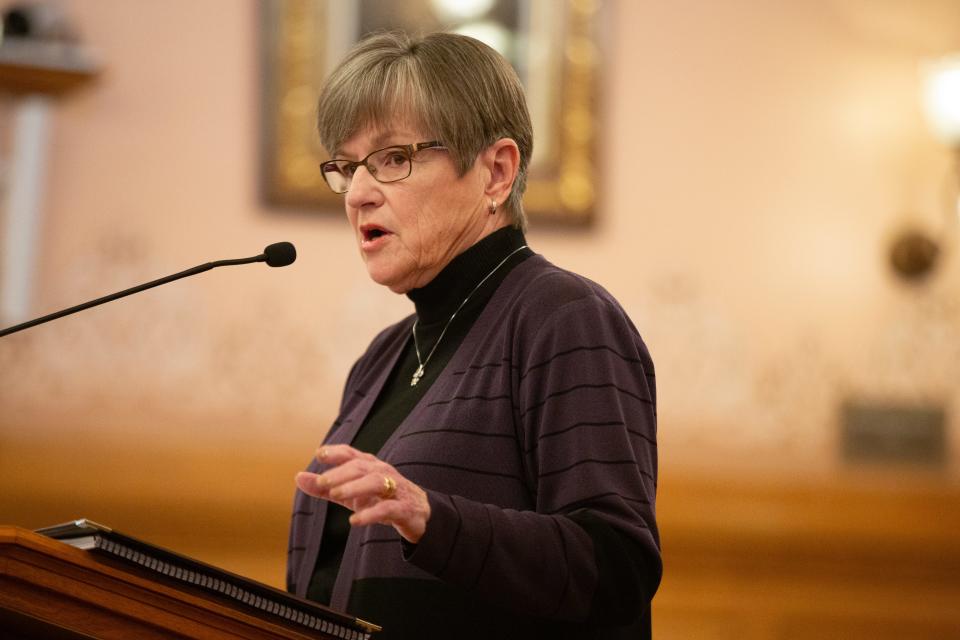
For the sixth year in a row, Democratic Gov. Laura Kelly is proposing Medicaid expansion. She said there are two reasons it has better political prospects this year.
"One, we have more data from other states that debunk all of the arguments against it," she said. "And two, it's an election year."
Kelly puts the blame squarely on the GOP leadership, not rank-and-file legislators.
"I still think that there are a number of those legislators who were here who would welcome the opportunity to debate and vote on Medicaid expansion," Kelly said. "It's really been leadership in both the House and the Senate that has blocked that opportunity. And I expect because it will be a major issue during the campaign that rank-and-file legislators will be petitioning leadership to give them the chance to vote this session."
House Speaker Dan Hawkins, R-Wichita, has taken on the role of the top opponent of Medicaid expansion.
"I will not let Medicaid expansion happen," he said. "And the reason why is because it's bad for the state."
Hawkins argued that the expansion would predominantly benefit childless adults who don't work, that it doesn't solve the low reimbursement rate Medicaid patients put into hospitals and that it disproportionately helps more urban areas where Medicaid patients live. An analysis by Georgetown University Rural Health Policy Project claims the opposite, and that rural areas are slightly more reliant on Medicaid in Kansas.
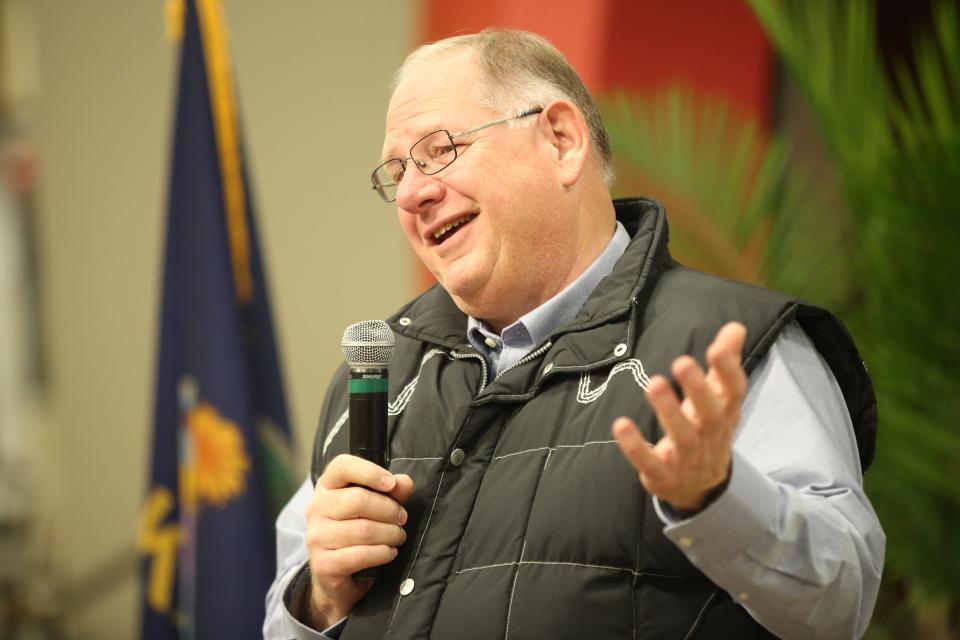
While Kelly considers her proposal to be more "middle of the road" with policy details designed to attract Republican support, like work requirements, GOP leadership remains uninterested in expanding Medicaid.
Hawkins picked at the work requirement provision by saying the five exemptions are broad enough that most people could game the system, and that the federal government has struck down work requirements in other states. Leadership in the Senate is also critical of the governor's proposal.
"It doesn't change the underlying facts," Masterson said. "The big three things that make a difference to me ... Medicaid expansion is not saving rural hospitals, it is not reducing emergency room usage and it is showing to displace actual current Medicaid eligible individuals."
Even if Kelly could make a deal with Masterson, that's "not to mention that it has to go through the House and the speaker's been quite vocal about the issue," he said. "So that's a whole other layer."
Masterson said Republicans are looking for an alternative health care proposal, perhaps with federally qualified health centers. He added that there's not a specific proposal yet, but that there are viable alternatives that do address access to care.
"It's really about getting care, right?" he said. "It's not about getting insurance. You actually have to get the care to the patient."
Everyone wants tax cuts, but can they agree on how to do it?
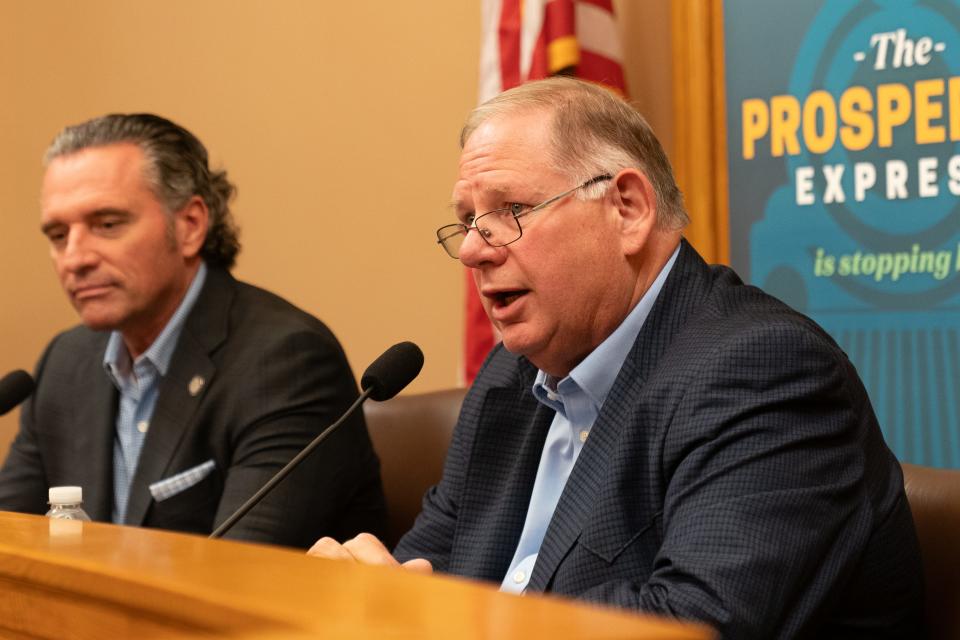
"Taxes are No. 1," Masterson said of his legislative priorities. "We would love to see the tax removed on Social Security and the single rate structure moving forward."
A single rate income tax, also known as a flat tax, is currently the most hotly debate tax policy. It would eliminate the state's three-tiered progressive income tax structure, replacing it with a single flat rate. Some versions of the idea have included a mechanism for future reductions until the income tax is eliminated.
"If you look at the states that are doing well economically, it's no tax states," Hawkins said. "The next tier that are doing the best are the states that have a single-rate tax."
Republicans call it simpler and fairer for everyone to pay the same rate, but Democrats criticize it because the greatest proportion of the benefits go to richer people — a point Republicans have countered with a mechanism to eliminate the entirety of the income tax burden on the poorest earners.
More: Division over this tax cut idea could mean no relief for any Kansans in 2024
There is bipartisan interest in addressing the so-called cliff in the income tax on Social Security benefits. Various approaches have been proposed in the past, including one to fully remove the tax as Masterson wants and others that phase out the cliff, such as one Kelly proposed.
Both sides of the aisle want to reduce the property tax burden.
Miller has proposed restoring state funding for local property tax relief through the local ad valorem tax reduction fund, which has long gone unfunded. Hawkins has proposed eliminating the fund entirely.
Miller and Hawkins have suggested cutting taxes via the state's relatively small property tax mill levy. Hawkins wants to reduce the levy. Miller wants to increase the exemption.
Both want to amend the Kansas Constitution. Miller's preferred amendment would reduce the assessment rate on residential properties, resulting in tax cuts for homeowners while shifting the burden onto other classes of property, thus increasing taxes on business owners. Hawkins' preferred amendment would limit the growth in property valuation, benefiting homeowners who don't move as they get older while shifting the burden onto new homebuyers.
Legislators could also pursue other proposals, such as reviving roughly two dozen tax cuts from last year's pair of failed bills.
Public education funding and school choice will be hot topics
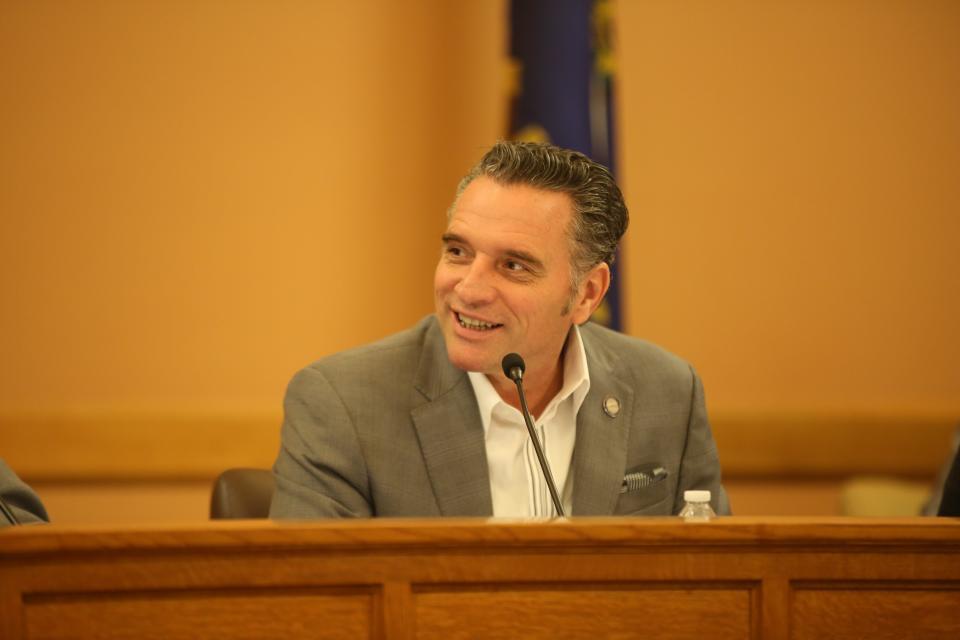
Education priorities start with funding, as education is the single biggest cost in the state budget.
Kelly touted the streak of fully funding schools, as required by the Kansas Constitution and Kansas Supreme Court, and doing so again is a top priority.
The high court has kept open an old lawsuit by public school district, but Attorney General Kris Kobach petitioned the justices last fall to close the case, an idea that has been criticized by public education advocates and opposed by the governor.
"We will fully fund in K-12 again," Kelly said, "and I will once again ask the Legislature to start phasing in special education funding so that we can reach our statutory requirement in a 5-year period."
Special education funding has been a contentious issue. Democrats have pushed for greater funding, alleging the state is breaking its own laws about funding levels. Top Republicans have argued against increased SPED funding and have floated the idea of rewriting the law.
Expanding school choice offerings in Kansas is a priority for Republicans. While they have previously succeeded at getting open enrollment, more recent pushes for vouchers, education savings accounts or other forms of school choice have lacked supermajority support. Last year's effort ultimately failed.
Masterson said school choice is a top legislative priority, even if a bill faces unlikely prospects of becoming law.
"We still would like to do something to empower parents on school choice," Masterson said. "Not sure that we can get over a veto on that."
Hawkins, however, said while he's supportive of school choice legislation, it'll be tough to override a veto.
"This governor's going to veto it no matter what, and we can only get 65 votes," Hawkins said. "We'll probably still work on a few areas where we may be able to use a tax credit, but as far as full school choice I'm not sure that we really spend a whole lot of time on that this year."
It also remains to be seen whether efforts to impose a private school enrollment modifier for the Kansas High School Activities Association classifications will make headway this year.
Rep. Tim Johnson, R-Basehor, led the push last year, but after the House Education Committee never worked the bill, Johnson said he was "asked not to" try to add it as a floor amendment to another education bill. The committee chair, Rep. Adam Thomas, R-Olathe, said last spring that it could potentially come up in 2024.
As for higher education, the likely biggest question on the minds of students and parents is whether tuition will go up.
After past years of banning state universities from raising tuition, the Legislature and governor allowed tuition increases last year, despite Kelly's campaign promise "continue supporting tuition freezes." The universities took advantage of the permission to raise tuition, which administrators said was needed because increased state funding alone would not cover the rising costs of inflation.
The appetite to ban tuition increases once more could become clearer once the governor's budget proposal is unveiled on Thursday.
Can child care bureaucracy be streamlined?
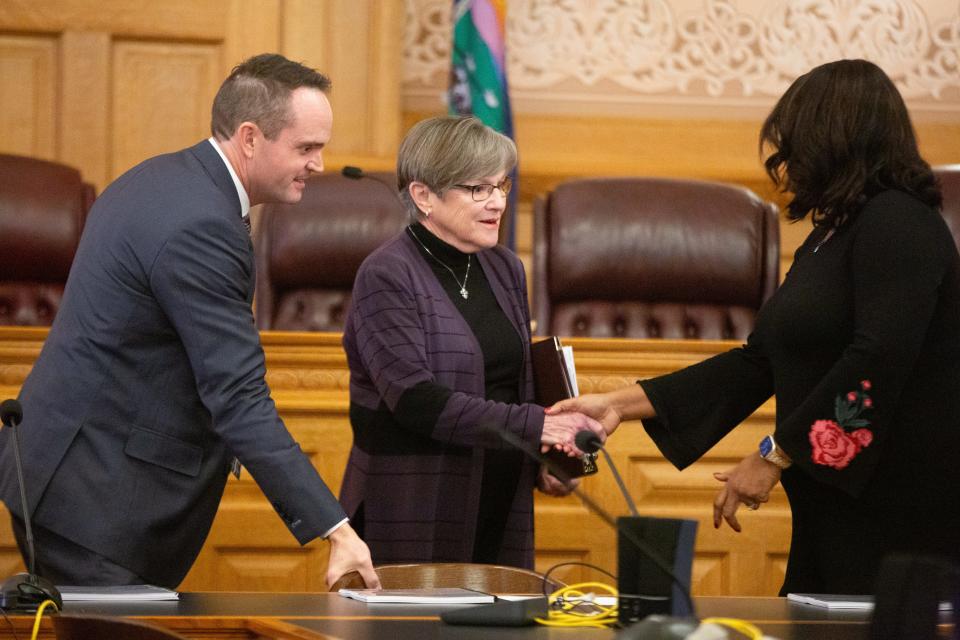
One of Kelly's reelection campaign promises was to create a cabinet-level position on child care and early childhood development.
Her first official action of her second term was issuing an executive order to create a task force to study the issue. By the end of the year, it recommended what programs to consolidate under a single state agency. But there was an acknowledgement that it may be politically easier to house such services under an existing agency instead of creating a new one as originally proposed.
"I would love to have it be a cabinet level agency," Kelly said. "I think early childhood education is that important, and I would love to elevate it to that status. I doubt that's going to happen."
Hawkins said he doesn't support a new agency to cover child care and said he favors cutting bureaucratic red tape to open up more childcare slots.
"It became pretty clear that a separate agency is not likely to pass muster on the third floor," Kelly said, meaning in the House and Senate. "But there was some consensus around the idea of at least consolidating the programs under one umbrella, but not necessarily this separate cabinet-level agency. So we'll see.
"We can negotiate with Legislature how that's going to look in the long run. I'm good with either one. I just want to get us streamline so that we're making better use of the resources that we've committed to the job."
Meanwhile, efforts are ongoing to streamline the bureaucracy in another way.
State agencies have a proposed overhaul of child care regulations as part of a process that was pending last session when Republican legislators attempted to overhaul the regulations themselves. Kansas Children's Cabinet executive director Melissa Rooker told lawmakers last month that the regulatory changes were awaiting approval from Kobach's office before they could continue.
"I know our comprehensive overhaul of the child care licensing rules and regulations have made it through the promulgation process to the attorney general's office, which is where they currently await the final approval from the AG so that you can have the legislative joint committee review them and a public comment period that needs to happen before they take effect," Rooker said.
Can abortion opponents get more public and private funding?
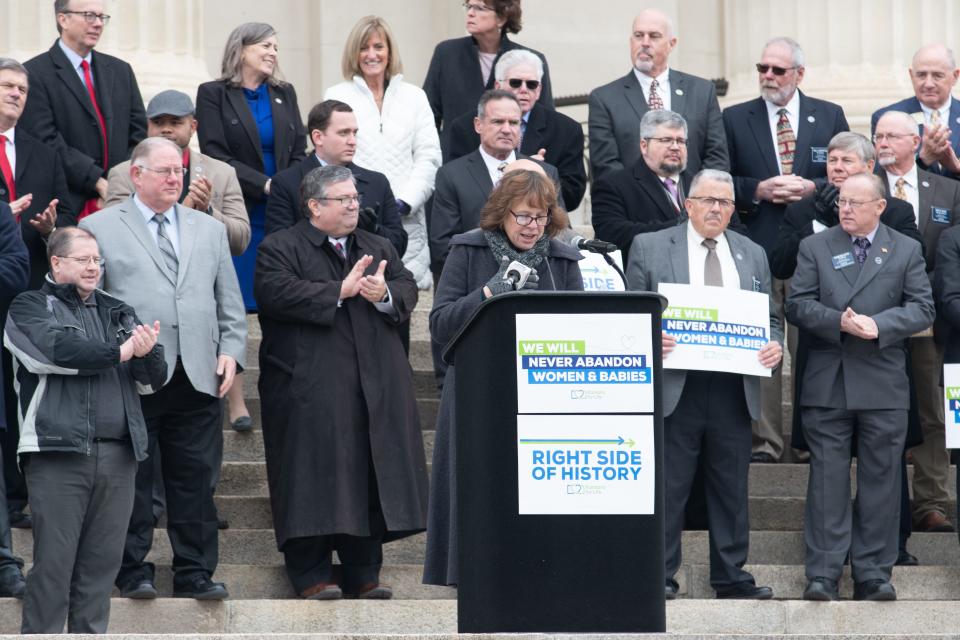
Anti-abortion legislation is likely to renew last year's efforts to direct taxpayer dollars to anti-abortion counseling centers while also incentivizing private donations with tax credits.
Such centers, known by supporters as pregnancy resource centers or crisis pregnancy centers, are hailed as ways to help provide material needs and education to girls and women who may otherwise choose abortion due to financial difficulties. But opponents argue that they mislead and misinform pregnant people.
Last year, legislators appropriated $2 million to a newly created Alternatives to Abortion Program by overriding Kelly's budget line-item veto.
Kansas State Treasurer Steven Johnson, a Republican, was in charge of the bidding process that ultimately selected the Kansas Pregnancy Care Network as the contractor to administer the program. The newly organized organization is led by former U.S. Rep. Tim Huelskamp, who was reportedly behind a misleading text message sent to Democratic voters about the Value Them Both Amendment.
"We're happy with the one that we have," Johnson said last month of the contractor.
While the said the Treasurer's Office could request status reports and make quarterly payments contingent on receiving those reports, it appears that no such reports have been requested. A Kansas Open Records Request by The Topeka Capital-Journal in November for any requests for such reports and the responsive reports found no documents existed.
"We don't have status reports," Johnson said. "Those will go to the Legislature to assess if they're happy with the performance and seeing what they had wanted from that investment. We hope we at least enable that so that they can get the reports that they want.
"It is fresh. They've only had a few months. We encourage them to be thinking to what reporting they could put together, but it would be hard to come up with in a quarter."
He said he expects there to be a status report sometime during the legislative session, acknowledging that it would likely be a desired update during the budgeting process. If the governor again line-item vetoes the funding, Republicans would need a supermajority that sees the value in continuing the funding.
"That has to be on everybody's radar, to make sure it works," Johnson said. "With the budget this year, I don't know if the Legislature has a placeholder in mind to confirm or how they're approaching it, but we will see."
Other hot-button issues may come up in 2024 Kansas legislative session
Medical marijuana. The issue faces unlikely prospects, largely due to opposition by key Senate Republicans. The House passed a medical marijuana bill in 2021, and the issue got an interim committee in 2022, but the bill drafted by that interim committee was scuttled by Sen. Mike Thompson, R-Shawnee, after one-sided hearings in his committee in 2023.
Legislative compensation. Thanks to a commission created by the Legislature, legislators are in line for a big pay raise in 2025 should they be reelected this fall. There have been some rumblings about the size of the raise, but it can only be stopped if both chambers pass resolutions disapproving of it. While such resolutions may be introduced, it is unclear if they will be given hearings or votes.
Election security. Despite assurances from Secretary of State Scott Schwab that Kansas elections are safe and secure, the Legislature has taken some action on election security legislation since 2020, some of which have since been tied up in courts. But more controversial proposals, such as banning ballot drop boxes and ending the three day grace period for mailed ballots, have not found as much support. Another try is expected this year in time to affect voting during the 2024 elections.
Transgender issues. Last session, the Republican-led Legislature succeeded in overriding Kelly vetoes of legislation banning transgender athletes from competing in girls' and women's sports and one strictly defining sex, which was initially touted as a bathroom bill but has since been used to deny gender marker changes on driver's licenses. They were unsuccessful at overriding a veto of a bill banning gender affirming care for transgender youths. There could be another push this year on that idea.
Homelessness. Legislators created an interim committee, which got one day to hear about the causes of homelessness and the effectiveness of potential solutions in Kansas. But the committee left with no clear direction on what to do.
Jason Alatidd is a Statehouse reporter for The Topeka Capital-Journal. He can be reached by email at jalatidd@gannett.com. Follow him on X @Jason_Alatidd.
This article originally appeared on Topeka Capital-Journal: Here are the biggest political issues for 2024 Kansas Legislature

